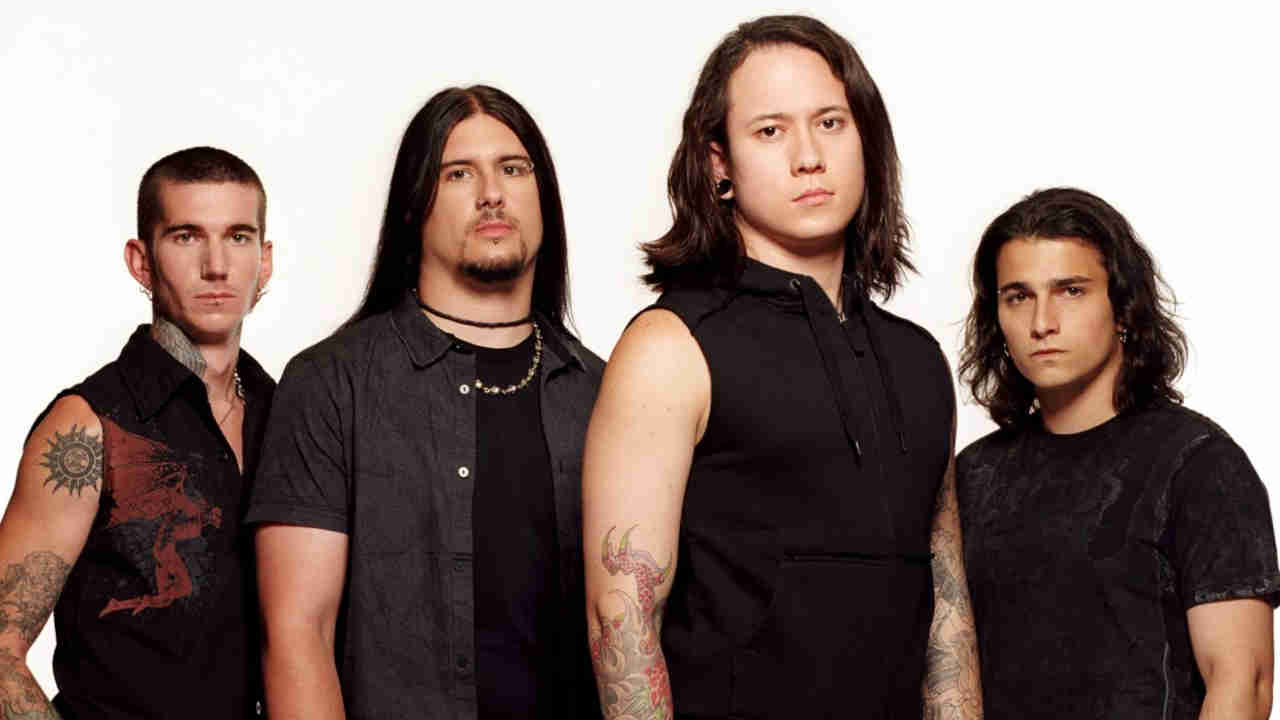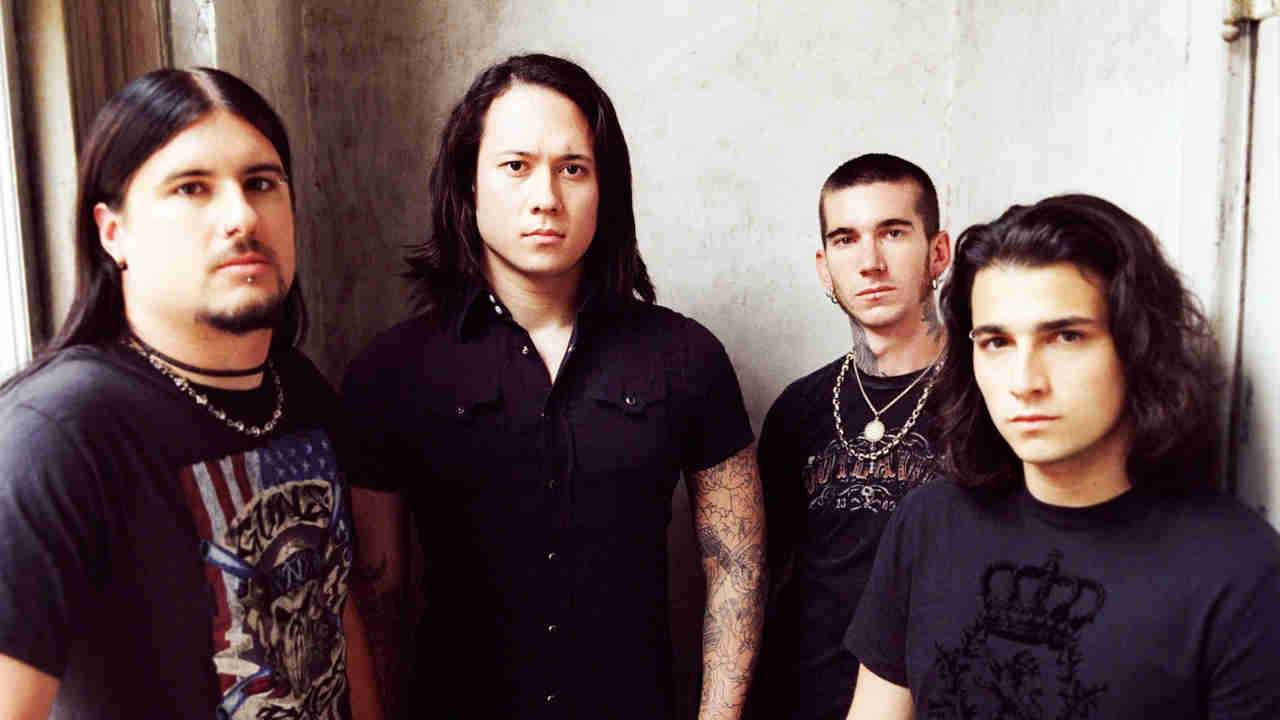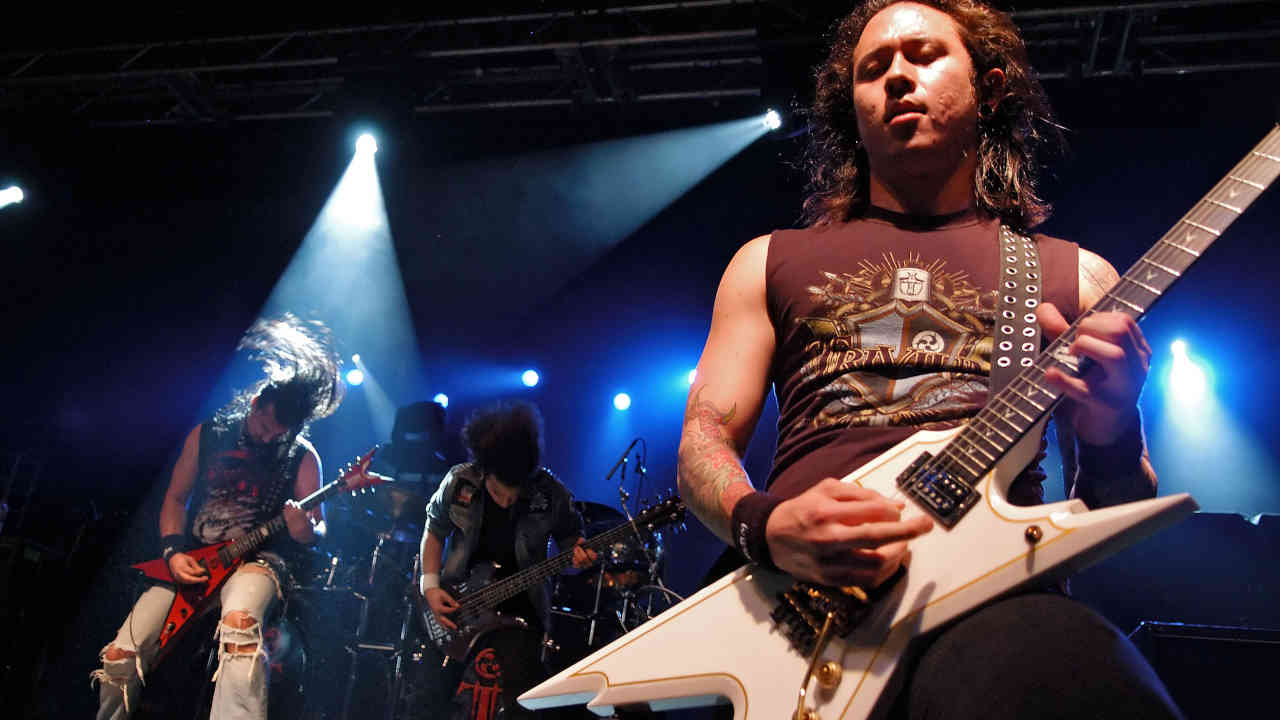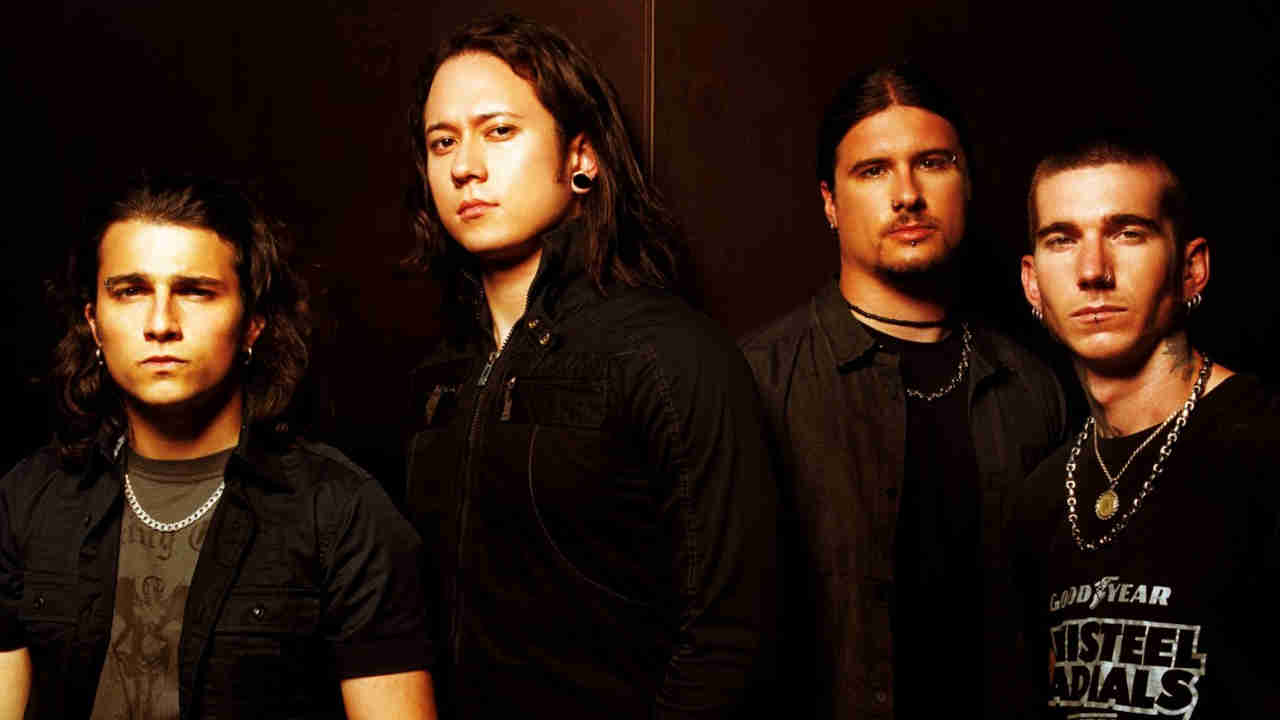
Trivium shot to fame with 2005’s breakout album Ascendancy and a star-making appearance at that year’s Download festival. But the following year’s The Crusade saw a backlash hit. In 2006, Metal Hammer caught up with the band on their first US tour to talk success, snobbery and the blessing of metal’s biggest bands.
The desert sun is blazing in a cloudless sky, turning your heavy breastplate into a furnace and boiling your brain in the heated metal confines of your helmet. Your coarse woolen tunic tears at your flesh while you struggle to keep your spear steady and your aim true. You drop the encumbering weight of your shield but your cape still tugs at your neck, belabouring your breath and making your fear of heights all the more unbearable as you stand atop a cliffside wondering whether the tiny holes dotting the landscape really are home to poisonous snakes.
It’s only noon, but your head screams with pain as you contemplate whether pounding over a dozen shots of Crown Royal whiskey and Jägermeister until 6am this morning was such a good idea. You smile faintly at a couple of joggers who wave as they pass by. They might just be wondering whether you’re the first human being in the 15 million year history of Phoenix, Arizona’s Papago Park to turn up dressed like a Spartan warrior. You’re Matt Heafy, 20-year-old frontman of Trivium, and for you, life has just gotten seriously weird.
If you were one of the thousands of metalheads on hand to witness Trivium’s slot at Download 2005, you might have some idea why. Just a few weeks before, the Floridian upstarts’ rapturously received UK tour was enough to propel a last minute change from a tent show to Donington’s centre stage. And it was also enough to make many believe that Trivium, this previously unknown dynamo of the live circuit, had suddenly arrived. Not even slightly.
Nearly 18 months have now passed, and in that time they’ve played nearly 400 shows. 2005’s Ascendancy has sold over 300,000 records worldwide, and the follow-up The Crusade has swiftly topped that with over 400,000 units shifted – 90,000 passed over the counter in the UK alone. 60,000 of those moved on the first day of release. Impressive stuff for a band that only formed in 2000 and whose average age is a mere 22.
But forget about numbers for a moment. Download 2006 also saw Trivium on the main stage at Download – twice. First, in the middle of the afternoon, and later on alongside none other than Sunday headliners Metallica. Kirk Hammett was wearing one of their shirts. Talk about your stellar ascents and golden stamps of approval.
You might wonder why it is then that Trivium are only just now playing their first headlining tour of the United States. Or why, in some circles, their album’s received a swift dismissal as a mere facsmile of Metallica riffs and, perhaps cutting closer to the bone, James Hetfield’s trademark vocal style. It would seem that being in the good graces of one of the biggest bands of all time has become something of a poison chalice.
“Look, it’s probably not what people think,” says bassist Paolo Gregoletto, kicking his snakeskin boots into the dust in the direction of drummer Travis Smith, who’s nursing the worst hangover from last night’s drunken late night festivities judging by the kill-me-now grimace on his face. “Metallica approached us, so it wasn’t like we were all, ‘hey, we want to talk to them’. They dug what we were doing and that was an honour. Besides, we made The Crusade before we even met them.”
Read that last sentence again and ask yourself why the diminuitive four-stringer would say such a thing. It would seem the M-word strikes a nerve. But there’s more to the latest chapter in Trivium’s story than once favourable comparisons to their idols transforming into the basis of derision. Or their crusade to gain acceptance in their homeland after receiving such a warm embrace in the UK. For that, we quick-march off to a waiting cab, kicking up dust in the setting sunlight of Papago Park, trying to remember the lyrics to that odious but diabolically infectious Paul Stanley song and dodging the tiny holes in the ground.

“Metalica are YouTube fanatics,” laughs Paolo. We’re just boarding the air-conditioned splendour of Trivium’s tour bus outside the arse-end of Phoenix’s Marquee Theatre where they’re due to play tonight. Perhaps tellingly, the 1,000 capacity venue isn’t sold out. Someone’s fingered ‘I love you Corey!!!’ and a big heart into the behemoth’s desert-dusted side. Travis and Matt immediately collapse in their bunks.
“They were like, ‘yeah man, check this shit out,’” continues Paolo, taking a seat in the lounge. “They already knew about us when we met at [Germany’s] Rock Am Ring…”
“What was cool was, we gave Kirk a copy of The Crusade when it wasn’t mixed, just the rough tracks, and he was like, ‘yeah it fucking kicks ass, old school’. He was really digging the primitive sounding stuff.”
But it’s no mystery that Trivium have, and not for the first time, suffered something of a critical backlash despite their impressive sales. And not least of all, because of a peculiar similarity between Matt’s voice and James Hetfield’s. You sound like Metallica.
“That’s better than a lot of things people have called it,” chuckles Paolo. “I’d be more mad if they called it metalcore. Of course there’s a huge Metallica influence in our albums. That’s a negative thing? We’re such huge fans. That’s a huge part of our lives. How is that not going to show?”
It seems a diplomatic response to what has dogged the band from the moment their follow-up to Ascendancy hit the shelves. Certainly, the similarities seem like no accident, but Paolo and Corey seem slightly offended at the suggestion. As they see it, listen a little more deeply to The Crusade and there’s far more than those similarities.
“You’re going to hear all of our influences on there!” blurts Corey. “Your mom, your dad, whatever the hell it is. Wherever you get that, whatever it sounds like it always sounds like something. Always. I don’t care who you are. Is anyone saying it sounds like Annihilator? I’ve been listening to them a lot too.”
Just then Matt emerges and takes a seat, and mutters something about the greatness of riding in a proper touring vehicle. It’s the first time Trivium haven’t been in a van Stateside. He’s picked up on the conversation. A detached smile reads across his face.
“We’ve got approval from Metallica and Iron Maiden,” he says, referring to Trivium’s latest support tour. “I don’t give a fuck if anyone else doesn’t. That proves that we’re metal. We’ve got too much else going on to worry about whether some people are ever going to accept us. Even I used to be a snob.”
The hungover frontman explains how bands like Emperor, Lord Belial, Aborym and Dark Funeral were what he grew up listening to. For him, it was about drawing a line in the sand as much as it was the music. The parallel makes sense.
“I don’t think the underground or extreme metal scene will ever dig us,” he continues. “It’s elitist. People are free to be into what they like, but in school everyone was into emo and hardcore, so I’d listen to the most Satanic and terrifying black metal I could find. Whatever scared them.”
So you were a snob?
“I was, but that culture just isn’t my personality. We’re going to be supporting Iron Maiden soon. They’re one of the biggest metal bands in history.”
Of course, this is only your first headlining tour of the States. You’d think it’d work the other way around seeing as you’re from this country.
Paolo says: “Everything develops at its own pace. The UK just happened to be the first place where it blew up, but slowly but surely, all the hard work we’ve put in has been paying off. You can’t go around the world and expect to do the same things everywhere at the same time. We want to be a worldwide headlining band, that’s our ultimate goal.”
That’s ambitious!
“Yeah, but it’s always like that for us. We’ve got to think that way. If you have nothing to prove, you have nothing to work for. Playing Download in 2005, on the main stage, was the ultimate high for us, but that’s just one step we had to take.”
“The States just isn’t ready for us yet,” adds Corey. “When we started out we were a band with no sales, so we’ve just been touring as much as possible to get the word out. You’ve got to get out and go and not think about the big picture all the time. As it is we’ve just got a couple of hours to get ourselves together. But it’s part of being in a band, it’s part of doing what we do.”

It’s an interesting point, because despite the thrilling success of Ascendancy, it won Trivium no luxurious studio time or stays in stately manors. But if you’re guessing that’s because of their record label Roadrunner cutting corners, then you’d be wrong. All of The Crusade was written on the road in the spare minutes and hours afforded to Trivium between interviews, load-ins, load-outs, shows, and whatever social lives granted them.
So why didn’t you have more time to write The Crusade?
“I wish!” says Matt. “Hopefully on the next record, but some bands do take too long. I’d like three or four months to write an album but last time we didn’t get the opportunity to do that.”
Why not?
“We wanted that, but we wanted to stay out on the road,” says Corey. “We all figured there was no point in sitting on our asses in a studio for a month. If we’d taken three or four months off, we would have fallen out of sight. If people don’t hear the name all the time the next band comes in and picks up your crowd. It’s like, ‘why stop?’”
That sounds a little paranoid. Do you really think that you’d lose all this in just a few months?
The guitarist takes a moment to think about it. He’s the quietest of the group, often opening his mouth to speak at the precise moment that Paolo begins speaking. But perhaps his is the best assessment of Trivium’s current predicament.
“When you’ve worked this hard for something you don’t want to risk anything. We’ve still got a very long way to go.”
“And we’ve made some mistakes too,” says Matt, “when we first started we were going crazy trying to inebriate ourselves, just mask ourselves from everything. When we first got into it we were just the young cocky kids that thought it was all about partying, but I think it was nice because the four of us are all pretty normal, pretty humble dudes. I mean, there are a lot of bands that are twice our age that act like idiots, but that’s not me. I prefer this way.”
What was your vice?
“It was totally sex, drugs, and rock’n’roll. Briefly.”
How briefly?
“Briefly.”
How long is ‘brief’?
“About a year,” he hesitates. “OK, a year and a half. It definitely wasn’t drugs so much, but it was us drinking every night and being new and naïve and really into it and having a good time. I’m having a good time now, but it’s me having a good time, not this person I thought I was having a good time.
“I look at interviews and I think, ‘man, I just sound like an asshole’. People praise that, they think that’s interesting, and a lot of bands crave that, but they’re going nowhere. They end up being a bunch of alcoholics playing crappy shows while they’re hungover every day.”
You’re ashamed of how you were?
“Not so much,” he says. “None of that really matters now. I mean, shit happens, and on top of that people will make up shit about our character. You’re not really doing well until people talk shit about you. Defamation and lies will happen no matter what you do. I used to worry about it.”
Do you regret all that now?
“Actually I’m glad that I did it,” he says. “There’s never been anything I’ve said that I’ve regretted, unless it was a complete misquote. But the shit where I’m probably fucking smacking my head, where I’m thinking ‘why the fuck did I say that?’ I’m not denying anything I’ve said, but I’ve learned from that so I’ll take responsibility for it. But then stuff gets written where you’re getting criticised for politeness. That’s actually the kind of person that I am!”
He’ll go on to describe how the mistake people make with him is that they expect him to be the same person offstage as when he’s on it, about how terrified he is at the thought of losing himself, being subsumed in the limelight. You just got out of school, do you stay in touch with your friends much?
“No,” he says. “Maybe I’ll see them at a show or something, but it’s mostly just the band, crew, mom, family, girlfriend…”
That’s a pretty small world, and certainly a pretty isolated one.
“I love the attention we get in the shows, I love making the videos and I love to see the fans out there but I would never knowingly act like a rock star. If I’m out at a mall, I’ll sign everything I’m given because even though I’m reserved I wouldn’t want to let my fans down. To be honest, I think I have mild social anxiety disorder sometimes.”
It sounds like a flippant self-diagnosis, but when really pressed on anything during this interview the newly long-haired frontman seems strangely ill-at-ease. He breathes deeply before replying, shifts uncomfortably in his couch and has the demeanour you’d expect of someone you were interviewing for a job. Heafy the frontman simply isn’t present.
“I’m fine at shows, but when I’m out with billions of people, from record companies, the press… being in those social situations, my brain sometimes just starts freaking out, and that’s happened a lot lately. There are days where there’s so many people involved in this thing called Trivium… I don’t know how the other guys are with it, but I’ve just noticed this problem recently. I want to be cordial, to say hi to everyone who’s hanging around but I’ve got problems and shortcomings just like everybody else. I’ve only freaked out a couple of times though, when it’s all just too much sometimes. I’m like, ‘fuck, what do I do here?’ but when that passes it’s fine. I’m fine on stage, but outside of that, I’m a dweeb. Video games and TV. That’s me.”

If you spend a little time with Matt you get the definite sense that the little shift in character he goes through when he’s on the stage and off is more than subtle. In real life he’s a completely different, unrecognisable guy from the one who’s known to conjure circle pits in the crowd, play blazing solos and seems, to many fans, superhumanly talented. But right now Matt rubs his left arm with other thngs on his mind. He’s just had a massive piece of tattoo work completed that’s currently wrapped up in cling film but clearly causing him discomfort.
“It’s late 1800s Japanese,” he says. “It’s from Japanese mythology where there was this demon terrorising Rashomon gate, and there was one samurai that was able to chop off the demon’s arm, but I’ve got the pre-battle scene where the samurai’s just about to go and chop the demon’s arm off.”
He’ll explain how it’s only very recently that he’s had a real awakening of curiosity in his heritage – Heafy’s mother is Japanese and used to relate that very same demon story to him when he was a child. According to Heafy, his was an idyllic upbringing. His mother and father are still together, he did well in school, he didn’t do drugs, and the worst problems he had were related to girls. Like many in their late teens, he went through a string of ‘stupid post school relationships’.
“All these young kids who are straight-edge now, a girl’s going to break their heart and they’ll start drinking,” he says, laughing. He’ll smile as he recalls the days when it was he who was outside of the mainstream. “That’s why I never give myself rules like that. When I was younger and I’d go to shows just so I could see the bands I liked, and I wouldn’t smile the entire time. If it wasn’t my band on stage, I’d just stand there and ignore it but we’re not about that now.”
So what drives you?
“What do you mean, why am I doing this?”
Yeah.
“It’s weird,” he says with a crooked grin. “I was gifted according the staff at my school, I wasn’t this nerd kid but I always did well. I’ve never had a job. This is my first. Maybe it’s because I don’t know anything else, or how hard this is supposed to be. It isn’t like touring’s easy, we’re up against it all the time. You don’t have any real comforts, there’s a lot of people who want to bring you down, but it’s getting past that kind of shit that makes a band big. We’re here to conquer. There’s no halfway for us.”
Later that night, with a packed crowd reciting his every lyric, Matt Heafy again becomes the frontman he’s recognised to be, like the geeky Peter Parker turning into the superhero Spiderman. He goads his audience, shouts, grunts and shreds his way through a 90 minute set as if he’s been doing this his whole life.
Wherever they go from here, it seems that Trivium’s story is only now just beginning.
Originally published in Metal Hammer issue 161.







